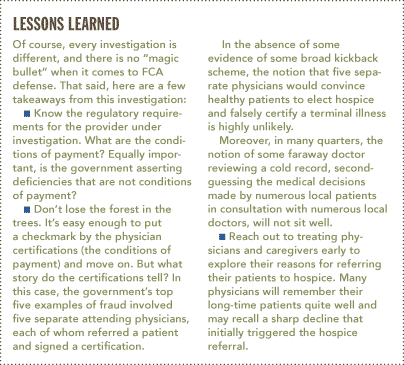Defending False Claims Act Medical Necessity Cases
A Recent Hospice Case Brings Physician Records To Bear In Validating The Need For Patients To Stay In The Program.
Jason E. Bring and W. Jerad Rissler
1/1/2015
In recent years, the government has demonstrated an increased willingness to use the False Claims Act (FCA) to challenge the medical necessity of services provided to Medicare beneficiaries.

In many cases, there is no dispute that the challenged services have been provided to Medicare beneficiaries and that the billings accurately reflect the services provided. Rather, the government asserts, based on a retrospective review, that the services actually provided were not “reasonable and necessary” and, therefore, should not have been provided and billed.
In the past, these medical necessity challenges would be handled almost exclusively through the specialized administrative appeals processes established by Congress, in which providers were often successful in demonstrating medical necessity.
A New Protocol
With increasing frequency, however, the government is pursuing medical necessity allegations in federal courts through the FCA, where the stakes are significantly higher, with the possibility of treble damages and civil penalties of up to $11,000 for each claim.
Often the first indication of a government investigation will be a call from a former employee indicating that they have been contacted by a government investigator or a subpoena requesting documents. At this point it is important to contact counsel (in-house or outside) to implement a litigation hold and to assist with the provider’s own investigation and the response to the government’s investigation.
The goal at this stage is to determine as much as possible what the government’s concerns are and to respond promptly and completely to those concerns. Often, counsel can work cooperatively with the government to narrow the scope of subpoenas to ensure a production that is more prompt and more focused on the government’s concerns.

Usually, following an investigation period involving document production and interviews of witnesses, the government will meet with the provider to discuss its findings, its concerns, and the possibility of a resolution. This meeting provides a good opportunity to gain a better understanding of the government’s concerns and the factors and evidence driving them.
Typically, following the government’s presentation, the provider will be given an opportunity to further investigate, and then respond to, the government’s concerns. This is often the best opportunity to influence the government’s view of the case and to either convince the government not to pursue the case as a FCA violation or to negotiate a resolution. This meeting provides an opportunity to tell the provider’s side of the story and to add context to any “bad” facts.
The Case
In a recent hospice case, the government alleged that the provider admitted patients to hospice who did not meet hospice criteria. The government relied, in large part, on a post hoc medical review in which a retained physician maintained that admitted hospice patients were not eligible for the hospice benefit. The provider’s attorneys were able to point to numerous government publications acknowledging the inherent uncertainty of a prognosis of a six-month life expectancy.
Out of the five patients whom the government presented as the “worst of the worst,” there were five separate attending physicians who had referred and certified those patients (along with the medical directors).
Thus, to believe the government’s story would be to believe that five independent, local physicians had referred their long-time patients to hospice care, and that these patients had agreed to receive hospice care, even though these physicians did not honestly believe that the patients were terminally ill. The attorneys further presented the review of a highly qualified expert on palliative care who testified that each of the government’s professed five worst examples was eligible for hospice.
Responding To The Complaint
The government ultimately filed a Complaint in Intervention.
In an attempt to circumvent the certifications of terminal illness that had been executed by multiple attending physicians (with absolutely nothing to gain by making a false certification), the government alleged that one of the hospice’s former medical directors had said that he was “not really” involved in the certification process and would only be “asked what he thought” about a patient.
The government did not directly allege that this medical director, or any other physician, had falsely certified any patient as terminally ill.

In response, the attorneys filed a Motion to Dismiss, arguing that the allegations in the complaint did not allege that any physician falsely certified any patient’s hospice eligibility with sufficient specificity or that the provider knew of any false certifications.
Shortly thereafter, they filed a similar Motion for Summary Judgment, attaching sworn declarations from every physician and medical director who had certified the hospice eligibility of every patient listed in the Complaint.
In each declaration, the physicians acknowledged that they continued to stand by their clinical determinations—as physicians personally involved in these patients’ care—that their certifications were valid when made and that these patients were terminally ill.
Physician Determinations Hold Up
Relying heavily on its allegation that a former medical director had said that he was “not really” involved in the certification process, the government requested that the court allow discovery so that it could explore whether the physicians had, in fact, relied on their clinical judgment. While the trial court allowed discovery, it required that the government produce all transcripts and notes from its interviews of witnesses (including the medical director).
None of the interview notes supported the government’s narrative that perhaps physicians were not really involved in the certification process but were simply relying on the hospice nurses to complete the certifications.
Armed with only an expert review that contradicted the independent clinical judgment of multiple local attending physicians, the government agreed to settle the matter for an amount less than its asserted single damages calculation.
Jason Bring is a partner in the Litigation and Healthcare practices at Arnall Golden Gregory (AGG) in Atlanta and leads the firm’s Long-term Care Industry Group. He can be reached at Jason.bring@agg.com or (404) 873-8162. Jerad Rissler is of counsel in the Litigation and Healthcare practices of AGG and represents clients in litigation, arbitration, and mediation. Contact him at Jerad.rissler@agg.com or (404) 873-8780.